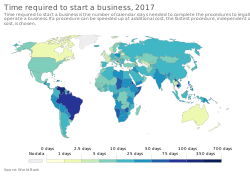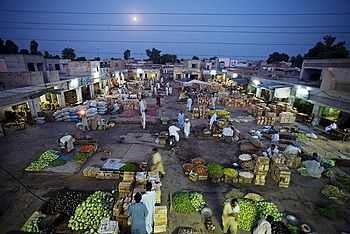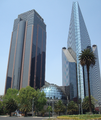Portal:Business
The Business and Economics Portal Business is the practice of making one's living or making money by producing or buying and selling products (such as goods and services). It is also "any activity or enterprise entered into for profit." A business entity is not necessarily separate from the owner and the creditors can hold the owner liable for debts the business has acquired. The taxation system for businesses is different from that of the corporates. A business structure does not allow for corporate tax rates. The proprietor is personally taxed on all income from the business. A distinction is made in law and public offices between the term business and a company such as a corporation or cooperative. Colloquially, the terms are used interchangeably. (Full article...) Economics (/ˌɛkəˈnɒmɪks, ˌiːkə-/) is a social science that studies the production, distribution, and consumption of goods and services. Economics focuses on the behaviour and interactions of economic agents and how economies work. Microeconomics analyses what is viewed as basic elements within economies, including individual agents and markets, their interactions, and the outcomes of interactions. Individual agents may include, for example, households, firms, buyers, and sellers. Macroeconomics analyses economies as systems where production, distribution, consumption, savings, and investment expenditure interact, and factors affecting it: factors of production, such as labour, capital, land, and enterprise, inflation, economic growth, and public policies that have impact on these elements. It also seeks to analyse and describe the global economy. (Full article...) Selected article
A photograph of traders on the New York Stock Exchange floor in 1963
Capitalism is an economic system in which the means of production are privately owned and operated for profit, usually in competitive markets. Income in a capitalist system takes at least two forms, profit on the one hand and wages on the other. There is also a tradition that treats rent, income from the control of natural resources, as a third phenomenon distinct from either of those. In any case, profit is what is received, by virtue of control of the tools of production, by those who provide the capital. Often profits are used to expand an enterprise, thus creating more jobs and wealth. Wages are received by those who provide a service to the enterprise, also known as workers, but do not have an ownership stake in it, and are therefore compensated irrespective of whether the enterprise makes a profit or a loss. In the case of profitable enterprise, profits are therefore not translated to workers except at the discretion of the owners, who may or may not receive increased compensation, whereas losses are not translated to workers except at similar discretion manifested by decreased compensation. (Full article...) Selected image
Selected economy The economy of Macau is a highly developed market economy. Macau's economy has remained one of the most open in the world since its handover to China in 1999. Apparel exports and gambling-related tourism are mainstays of the economy. Since Macau has little arable land and few natural resources, it depends on mainland China for most of its food, fresh water, and energy imports. Japan and Hong Kong are the main suppliers of raw materials and capital goods. Although Macau was hit hard by the 1997–98 Asian financial crisis and the early 2000s recession, its economy grew approximately 13.1% annually on average between 2001 and 2006. Macau is a full Member of the World Trade Organization. Public security has greatly improved after handover to the People's Republic of China. With the tax revenue from the profitable gambling industry, the Macau government is able to introduce the social welfare program of 15 years of free education to all Macau citizens. In 2015, Macau's economy saw a sharp decrease (-26.4% year-on-year in Q2 2015) due to the reduced spending by visitors from Mainland China since the Anti-corruption campaign under Xi Jinping. (Full article...) Selected quoteThe author is far from taking the view held by many manufacturers that labor unions are an almost unmitigated detriment to those who join them, as well as to employers and the general public. The labor unions — particularly the trades unions of England — have rendered a great service, not only to their members, but to the world, in shortening the hours of labor and in modifying the hardships and improving the conditions of wage workers. In the writer's judgment the system of treating with labor unions would seem to occupy a middle position among the various methods of adjusting the relations between employers and men. When employers herd their men together in classes, pay all of each class the same wages, and offer none of them any inducements to work harder or do better than the average, the only remedy for the men lies in combination; and frequently the only possible answer to encroachments on the part of their employers is a strike. This state of affairs is far from satisfactory to' either employers or men, and the writer believes the system of regulating the wages and conditions of employment of whole classes of men by conference and agreement between the leaders of unions and manufacturers to be vastly inferior, both in its moral effect on the men and on the material interests of both parties, to the plan of stimulating each workman's ambition by paying him according to his individual worth, and without limiting him to the rate of work or pay of the average of his class.
TopicsRelated WikiProjectsDid you know (auto-generated) -
On this day in business history
General imagesThe following are images from various business-related articles on Wikipedia.
More did you know
Business news
SubcategoriesRelated portals
Things you can doUrgent and important articles are bold
WikimediaThe following Wikimedia Foundation sister projects provide more on this subject:
SourcesDiscover Wikipedia using portals |







































